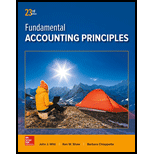
Concept explainers
Concept Introduction:
Equivalent Units of Production:
The equivalent units of production can be defined as the units which are partially completed to be counted as fully completed units based on their percentage of work done on them.
For example, the units in ending inventory are 1,000 units and 60 % completed. Thus, the equivalent units for ending inventory will be = 1,000 units X 60 % = 600 units.
First-in, first-out (FIFO):
In FIFO method of inventory, the cost of goods sold and ending inventory are valued at the older prices. The cost of goods sold are valued at the older prices and the inventory which remains unsold are with the newest prices. This method says that, the inventory first purchased is first sold the ending inventory consists of the latest purchases.
To calculate:
The assembly department’s equivalent units of production for materials and for conversion for November using FIFO method.
Answer to Problem 14QS
Solution:
| Equivalent units of Production for November | ||
| Materials | Conversion | |
| Equivalent Units | 10,200 units | 9,100 units |
Explanation of Solution
The equivalent units of production for Materials and Conversion for can be calculated as under –
First, units added and completed 100 % from the process will be calculated.
Given,
• Units transferred out = 9,000 units
• Beginning inventory units = 2,000 units
Out of total units transferred, 7,000 units were added and completed and transferred out during the process.
Equivalent
| Equivalent units of production -FIFO | ||
| Direct Materials | Conversion | |
| Units to complete - Beginning Inventory | ||
| Direct Materials (2,000 X 40%) | 800 | |
| Conversion (2,000 X 60 %) | 1,200 | |
| Units completed and transferred out | 7,000 | 7,000 |
| Units completed - Ending Inventory | ||
| Direct Materials (3,000 X 80%) | 2,400 | |
| Conversion (3,000 X 30%) | 900 | |
| Equivalent units of production | 10,200 | 9,100 |
The above calculations can be explained as under –
For beginning inventory –
Given,
• Units in beginning inventory = 2,000 units
• For direct material completed percentage = 60 %
• For conversion completed percentage = 40 %
Units to be counted from beginning inventory for materials –
Units to be counted from beginning inventory for conversion –
For units added, completed and transferred out –
7,000 units calculated as above
For ending inventory –
Given,
• Units in ending inventory = 3,000 units
• For direct material completed percentage = 80 %
• For conversion completed percentage = 30 %
Equivalent units for ending inventory for materials –
Equivalent units for ending inventory for conversion –
Total equivalent units for production for materials and conversion will be calculated as under –
Given,
For materials –
• Beginning equivalent units = 800 units
• Completed and transferred = 7,000 units
• Ending equivalent units = 2,400 units
For conversion –
• Beginning equivalent units = 1,200 units
• Completed and transferred = 7,000 units
• Ending equivalent units = 900 units
Thus, the assembly department’s equivalent units of production for materials and for conversion for November using FIFO method have been calculated.
Want to see more full solutions like this?
Chapter 20 Solutions
Fundamental Accounting Principles
- Can you solve this general accounting problem with appropriate steps and explanations?arrow_forwardEdison Manufacturing uses a single raw material in its production process. The standard price for a unit of material is $2.25. During the month, the company purchased and used 820 units of this material at a price of $2.10 per unit. The standard quantity required per finished product is 4 units, and during the month, the company produced 200 finished units. How much was the material price variance?arrow_forwardCan you help me solve this general accounting question using the correct accounting procedures?arrow_forward
- FeatherSky Ltd. has a balance sheet equity of $7.1 million. At the same time, the income statement shows a net income of $1,120,000. The company has 175,000 shares of stock outstanding. If the benchmark PE ratio is 25, what is the target stock price in one year?arrow_forwardWhat was the sales price per unit?arrow_forwardWhat is the total amount of variable costs related to the units sold?arrow_forward
- 4 POINTSarrow_forwardI am searching for a clear explanation of this financial accounting problem with valid methods.arrow_forwardAlbert Crafts produces two types of handmade candles: Standard and Luxury. The Standard candle sells for $12 with variable costs of $8 per unit, while the Luxury candle sells for $25 with variable costs of $15 per unit. Albert Crafts maintains a sales mix ratio of 70% Standard and 30% Luxury candles. Monthly fixed costs total $42,000. How many total candles (of both types combined) must Albert Crafts sell to break even?arrow_forward
- Can you solve this financial accounting problem with appropriate steps and explanations?arrow_forwardParkview Manufacturing produces custom furniture and uses a standard costing system. During April, they purchased 3,200 pounds of raw wood at $4.75 per pound, while the standard price was $4.50 per pound. The standard quantity of wood needed for the 800 chairs produced that month is 3.5 pounds per chair. Calculate both the material price variance and the material quantity variance, and interpret whether each variance is favorable or unfavorable.arrow_forward3 POINTSarrow_forward

 AccountingAccountingISBN:9781337272094Author:WARREN, Carl S., Reeve, James M., Duchac, Jonathan E.Publisher:Cengage Learning,
AccountingAccountingISBN:9781337272094Author:WARREN, Carl S., Reeve, James M., Duchac, Jonathan E.Publisher:Cengage Learning, Accounting Information SystemsAccountingISBN:9781337619202Author:Hall, James A.Publisher:Cengage Learning,
Accounting Information SystemsAccountingISBN:9781337619202Author:Hall, James A.Publisher:Cengage Learning, Horngren's Cost Accounting: A Managerial Emphasis...AccountingISBN:9780134475585Author:Srikant M. Datar, Madhav V. RajanPublisher:PEARSON
Horngren's Cost Accounting: A Managerial Emphasis...AccountingISBN:9780134475585Author:Srikant M. Datar, Madhav V. RajanPublisher:PEARSON Intermediate AccountingAccountingISBN:9781259722660Author:J. David Spiceland, Mark W. Nelson, Wayne M ThomasPublisher:McGraw-Hill Education
Intermediate AccountingAccountingISBN:9781259722660Author:J. David Spiceland, Mark W. Nelson, Wayne M ThomasPublisher:McGraw-Hill Education Financial and Managerial AccountingAccountingISBN:9781259726705Author:John J Wild, Ken W. Shaw, Barbara Chiappetta Fundamental Accounting PrinciplesPublisher:McGraw-Hill Education
Financial and Managerial AccountingAccountingISBN:9781259726705Author:John J Wild, Ken W. Shaw, Barbara Chiappetta Fundamental Accounting PrinciplesPublisher:McGraw-Hill Education





